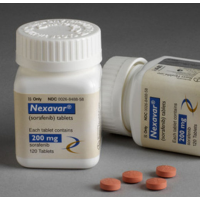Supreme Court Rules in Favour of Generic Drugs, Rejects Bayer’s Appeal
 Natco's generic drug costs just 3% of Bayer's Nexavar (file photo: Bayer)
Natco's generic drug costs just 3% of Bayer's Nexavar (file photo: Bayer)
In a ruling that is being cheered by both activists and Indian pharma companies, the Supreme Court rejected German drugmaker Bayer’s last-ditch attempt to block the sale of a cheap generic version of its cancer drug Nexavar in the country.
The decision on Friday upheld an earlier ruling by the Bombay High Court, and is being seen as a "momentous" win for public health as well as a blow to global drugmakers' efforts to protect their high-price medicines in India.
This brings to an end the legal challenge to the country’s first-ever compulsory license, issued in 2012 to Indian generics group Natco Pharma, that allowed it to sell a copycat version of Nexavar, which is used to treat kidney and liver cancer.
Under a global Trade-Related Aspects of Intellectual Property Rights agreement, countries can issue compulsory licenses on certain drugs that are considered unaffordable to a large section of their populations.
The Indian patents office had given permission to Natco to sell a generic version of Nexavar at Rs. 8,800 ($141) for a month's dose, a mere 3% of Bayer's price of 280,000 rupees ($4,487).
But Bayer had challenged this compulsory license, arguing that it weakens the international patent system and endangers pharmaceutical research.
The company said it was disappointed by the Supreme Court decision and its legal experts were evaluating the verdict. "We are analyzing the order and will determine any future course of action afterwards," a spokesman said.
According to Reuters, Western pharmaceutical groups have a lengthy history of patent problems in India, which has a thriving generic drugs industry and where patented drugs are unaffordable for most people.
In another high profile case last year, Swiss drugmaker Novartis’s atempt to win patent protection for its cancer drug Glivec was also dismissed by the Supreme Court.
Friday's decision highlights India's “critical role” in “balancing intellectual property and public health,” Leena Menghaney, South Asia regional head of Medicins San Frontieres, told AFP.
According to legal experts, the highest court’s ruling would encourage more Indian companies to come forward with generic medicines. After the first compulsory license was legally challenged by Bayer, most domestic firms had shied away from providing affordable alternatives. That is now set to change with the clear decision in favour of generic medicines.
- Karan Singh
To Learn More:
SC dismisses Bayer plea against generic drug (by Rupali Mukherjee, The Times of India)
Bayer fails to block generic cancer drug in India's top court (by Ben Hirschler, Reuters)
Crippling Dominance of Big Pharma, Indian Judge Blocks Bayer's Drug Monopoly Bid (by Lauren McCauley, Common Dreams)
Indian Patent Ruling against Bayer Clears Way for Low-Cost Generics in Blow to Big Drug Firms (by Noel Brinkerhoff, AllGov)
India Orders Bayer to License a Patented Drug (by Vikas Bajaj and Andrew Pollack, The New York Times)
- Top Stories
- Controversies
- Where is the Money Going?
- India and the World
- Appointments and Resignations
- Unusual News
- Latest News
- India College Chain’s Expansion into U.S. Draws Opposition from Massachusetts Officials over Quality of Education
- Milk Shortages in India Tied to Release of New Movies Featuring Nation’s Favorite Stars
- Confusion Swirls around Kashmir Newspaper Ban in Wake of Violent Street Protests
- Polio-Free for 5 Years, India Launches Vaccine Drive after Polio Strain Discovery
- New Aviation Policy Could Increase Service, Lower Ticket Prices






Comments